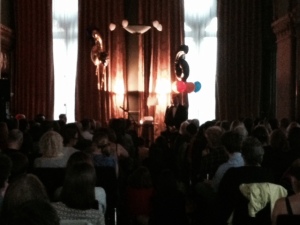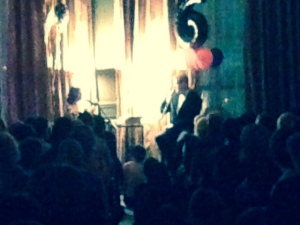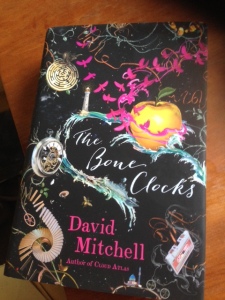On 8th September I attended one of Damian Barr’s celebrated literary salons. The event was held in the Victorian splendour of the Ladies’ Smoking Room (!!) of the St Pancras Renaissance Hotel. Ably hosted by the effervescent Damian , it is an opportunity for bookish people to come together, discuss literature and drink gin.
Having completed a London to Brighton charity bike ride the day before, Damian professed himself to be both chuffed and chafed to be hosting the 6th Birthday event and possibly the last salon for which he will not require a passport to attend ( he is Scots ) !
We then met our guests in turn. I haven’t actually read any of the books under discussion so rather than a review I hope to give a flavour of the evening and the books presented to us.
First up was Alan Johnson, a union leader and former Home Secretary now turned memoir writer who had come to present his latest book Please Mr Postman , a follow up to This Boy, which will be published on 18t Sept.
Alan explained that this book takes up his life story at the age of 18 and just as he had joined the Post Office ( he was the leader of the postman’s union) in Barnes London SW13. His older colleagues were all of a generation that had fought in WW2, with fathers that had fought in WW1. There was much that was very militaristic about the post office then. Everything was done by hand with no mechanisation and, in terms of working practices, very little had changed since the First World War.
In This Boy, Alan detailed his deprived childhood in West London, abandoned by his father and blighted by the early death of his adored mother, Lily. As this new book opens, Alan is married to his first wife ,Jackie, becoming a step father to her child and a father in his own right. Damian remarked that this seemed like a lot to take on aged only 18.
Alan explained that he and Jackie were allocated a council house in Slough, which they loved, he had a job for life with a pension and a union to defend him. In many ways they were not facing the uncertainties that young couples face now.
He spoke movingly of his time in the postman’s union ( then called UPOW but now the CWU) most particularly of the educational opportunities it had given him.
He doesn’t miss his time in politics and is now very much enjoying his new life as a writer. His is unsure about his next project. He doesn’t want to write a political memoir and hinted that he may be working on a novel.
Next up was Esther Freud whose book Mr Mac And Me, already published, had not been on my radar , although it certainly is now.
Set in 1914 in the Suffolk village of Walberswick, it narrated by 12 year old Thomas, son of the local publican and recounts the friendship that grows between him and Charles Rennie MacIntosh who is visiting .Esther read an extract from the book, which Damian described as spooky with the past echoing in the present.
The inspiration for the book came from Esther’s own house in Walberswick which had formerly been the village pub. The house had in fact been in her family since the 1940s and she bought it fully furnished. She immediately felt a ghostly presence at the back of the house. She knew this was a young boy and used to greet him whenever she became aware he was there.
She had originally started to write the story of the house with the ghost appearing in it. As a writer it is horrible to admit but sometimes you just have to accept your story isn’t working. Her narrative had become boring and she was bogged down by domestic detail . She started to give the ghost a voice and Thomas emerged, after that she just wanted to be with him.
MacIntosh had actually visited Walberswick in 1914, just before the outbreak of war.He was at a low point in his life . He had been a rising star in his youth and had won the commission for the Glasgow School Of Art for his firm.By the time he visited Walberswick however his life was in decline.
He had become known as difficult and a drinker. He was a perfectionist and difficult to work with. Although he was well regarded in Europe ( crucially in Germany and Austria) he was pretty much overlooked in Britain and very short of money.
He came to Walberswick at the invitation of Frances Newberry, Director of Glasgow School Of Art, who had a house there.Shortly after he arrived , war was declared and spymania took over. He was regarded with suspicion because of his foreign ( Scottish!) accent and had also written some letters in German ( to his benefactors there) and so was arrested. He was eventually freed after the intervention of his English and well connected wife but was banned from ever visiting Norfolk, Suffolk or Essex again.
Esther felt she had known the story of Thomas for a long time before writing it as he had been present in her home but she was surprised by the many parallels in his life and Mac’s as she researched for the story.
She was asked by a member of the audience how she managed to still her critical voice in order to work.The only way to do this is ‘ Just do it’ ! The only was to still the criticism is to continue to write.
Our final guest was David Mitchell, there to discuss his latest, Booker long listed novel The Bone Clocks.
This is David’s 6th novel and ranges in time from 1984 to a near future dystopia. He read us three extracts , the first set in 1991 with a ‘West London posh kid’ ; the second an hilarious encounter between a celebrated writer and a would-be fan at Hay Festival in 2014 and the third narrated in 2025 by Marinus a character who also appeared in Mitchell’s The Thousand Autumn’s of Jacob de Zoet.
Damian asked him how he had conceived these six interconnecting novellas, did each come as a character?
David has come to realise that he is not actually a novelist.He can only write in small units and his optimum form is between 70 o 130 pages. He sees this as his getaway car in which to escape the tedium of writing a long novel.
Asked about his main character,Holly Sykes, David explained that a comprehensive school had been a very scary place for a bookish 13 year old. It had , however, provided him with much material as a novelist. Holly was based on some of the girls he remembered from school who he admired but felt scared of.
As a teenager, Holly starts to hear voices which might , of course, be the onset of schizophrenia but what if the voices are real? Her life is then turned on its head by the disappearance of her younger brother.
Damian asked how he has constructed the novel. David replied that as a writer you sometimes find that what you are actually writing turns out to be the ‘wanky scaffolding’ on which a better piece can be constructed, rather as Esther had described earlier.
Originally this was going to be a series of short stories showing Holly throughout her life. He found that , novelistically anyway, children are not really interesting until the get to about aged 8.
He also had to accept that short stories read differently to a novel. They are almost like poems, each word must be gleaned for significance and you can’t use literary devices such as foreshadowing or backstory. It is very difficult to sustain that over 600 pages – as a writer or as a reader.
Damian noted that many characters reappear from novel to novel. To what degree is that preplanned or does it just develop? David has been holding Marinus in his head for a while. He is acutely aware that our lifestyle now is funded by deals for which our children and grandchildren will have to pick up the tab.
He was then asked about Crispin Hershey who has been likened to Martin Amis. David denied that he was a caricature of Amis, he hasn’t got the time or energy for confrontational literary spats . He considers Amis to be a great writer. He doesn’t think about fandom and hero worship, which to some extent Crispin experiences. He is honoured that people will give him their time and money but does find it alarming that some people can be so devoted.
He enjoyed his experience of working on the opera librettos not least because of the pleasure of working in a collaborative way. The work of a novelist is very lonely. He has no plans for any more however. He is rather in love with this big, baggy, gentle, vicious form the novel and wants to explore it some more.
He has been quoted as saying he has his next 4 or 5 books already inside his head. David explained that by this he means he knows enough about them to start hoarding research material. He can reveal that his next project is a short book.
This was a magical evening which I enjoyed enormously. The kind of occasion at which you find you are standing next to David Mitchell and he is carrying a water-melon. The guest list was star studded – I saw Tracey Thorne, Ben Watt, David Nicholl and just tried to look nonchalant, like this was a pretty average night out for me.
Many thanks to Damian Barr for a fabulous soiree.





